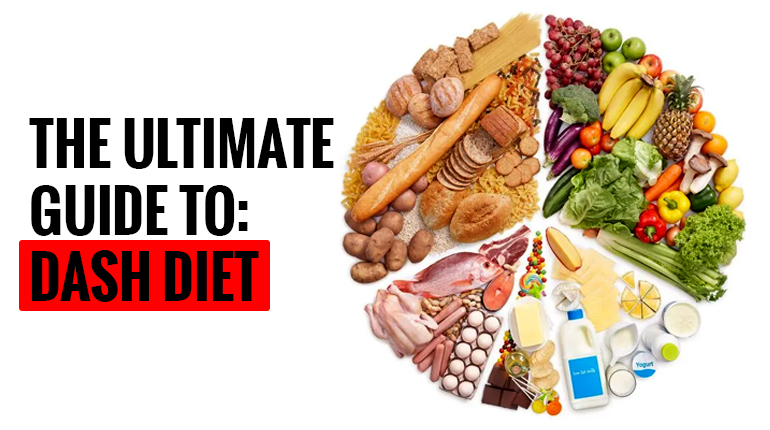DASH Diet: A Comprehensive Guide to Lowering Blood Pressure and Improving Heart Health

Tired of disappointing fad diets that fail to deliver? Enter the DASH diet, your savior. Unlike extreme methods or restrictive eating, DASH offers a sensible approach to improving your health, lower blood pressure, and achieving overall wellness.

Think of DASH as the calm and collected alternative to crash diets, which often leave you hungry and irritable. It promotes balance, moderation, and the consumption of nutrient-dense foods that nourish your body and provide lasting satisfaction. Say goodbye to kale smoothies and embrace the world of DASH with a slice of whole-grain bread. Let's explore its wonders together.
Components of a DASH Diet
The DASH diet, short for Dietary Approaches to Stop Hypertension, Developed by the National Heart, Lung, and Blood Institute (NHLBI), is a dietary approach designed to prevent and lower high blood pressure. It is a well-researched and highly recommended diet plan that promotes a balanced intake of nutrients to reduce blood pressure and lower the risk of chronic diseases like heart disease and stroke.
It promotes a balanced intake of nutrients to improve overall health, with a particular emphasis on heart health. The DASH diet emphasizes the consumption of whole foods that are rich in nutrients such as fruits, vegetables, whole grains, lean proteins, and low-fat dairy products. At the same time, it limits the intake of processed and high-sugar foods.
Here are some specifications of the DASH diet:
1. Sodium intake:
The DASH diet recommends limiting sodium intake to no more than 2,300 milligrams per day (or 1,500 milligrams per day for individuals with hypertension, African Americans, or middle-aged or older adults). To reduce sodium intake, the DASH diet emphasizes the consumption of whole foods that are naturally low in sodium, such as fresh fruits and vegetables, whole grains, and lean proteins. It also encourages the use of herbs and spices as flavorings instead of salt.
2. Fruit and vegetable intake:
The DASH diet recommends consuming 4 to 5 servings of fruits and vegetables per day that are packed with fiber, vitamins, minerals, and antioxidants. It emphasizes a variety of colorful fruits and vegetables, including leafy greens, berries, citrus fruits, carrots, and sweet potatoes. A serving size of fruit is about 1 medium-sized fruit or 1/2 cup of fresh, frozen, or canned fruit while a serving size of vegetables is about 1 cup of raw leafy vegetables or 1/2 cup of cooked vegetables.

3. Whole grains:
The DASH diet recommends consuming 6 to 8 servings of whole grains per day, such as whole wheat bread, brown rice, and whole grain pasta. They also provide important vitamins and minerals, such as B vitamins, iron, and magnesium. A serving size of grains is about 1 slice of bread or 1/2 cup of cooked rice, pasta, or cereal.

4. Lean proteins:
The DASH diet recommends consuming 6 or fewer servings of lean protein per day, such as skinless chicken and turkey, fish, and beans. A serving size of protein is about 1 ounce of meat, poultry, or fish, or 1/2 cup of cooked beans or lentils. Lean proteins are important for building and maintaining muscle mass, which is essential for overall health and fitness.

5. Low-fat dairy:
The DASH diet recommends consuming 2 to 3 servings of low-fat dairy products per day, such as skim milk, low-fat yogurts, and low-fat cheese. A serving size of dairy is about 1 cup of milk or yogurt. Dairy products are a good source of calcium, which is important for bone health. Low-fat dairy products are also lower in saturated fat and calories, making them a healthier choice than full-fat dairy products.

6. Fats and oils:
The DASH diet recommends consuming healthy fats, such as olive oil, nuts, and seeds, in moderation. They are also important for brain function and overall well-being. The recommended daily intake of fat is about 27% of total daily calories.

By following the DASH diet, individuals can achieve a balanced intake of essential nutrients that can help reduce high blood pressure, lower the risk of heart disease, and improve overall health.
DASHing Through the Obstacles: Tips for Sticking to the DASH Diet
The DASH diet can be an effective way to improve your health, but it can be challenging to stick to any new eating plan. Here are some tips to help you abide by the DASH diet:
1. Plan your meals:
Planning your meals ahead of time can make it easier to stick to the DASH diet. Use a meal planner or app to help you plan your meals for the week, include plenty of fruits, vegetables, whole grains, and lean proteins.

2. Cook at home:
Cooking your meals gives you control over the ingredients and can help you avoid processed foods and excess salt. Experiment with new DASH-friendly recipes.
3. Use spices and herbs:
The DASH diet encourages the use of spices and herbs instead of salt to add flavor to your meals. Experiment with different spices and herbs to find new flavor combinations.

4. Keep healthy snacks on hand:
Having healthy snacks like fruits, vegetables, and nuts on hand can help you avoid temptation when you're hungry. Try to keep healthy snacks in your purse, car, or office so you always have a healthy option available.
5. Limit your alcohol intake:
Alcohol can add calories and interfere with your weight loss goals. Limit your alcohol intake and try to stick to one drink per day for women and two drinks per day for men.

6. Find a support system:
Find a friend or family member who can help keep you accountable and motivated, or join an online community of others who are also following the DASH diet.

7. Don't be too hard on yourself:
Changing your eating habits can be challenging, and it's important to remember that nobody is perfect. Don't punish yourself if you err and consume an unhealthy lunch or snack. Instead, focus on getting back on track and making healthier choices in the future.
DASH Your Way to Better Health

In summary, deciding whether to follow the DASH diet is a personal decision that involves considering individual factors such as health, lifestyle, budget, and personal preferences. Consulting with a healthcare professional and registered dietitian can help create a customized plan that suits specific needs. The DASH diet is an effective and well-researched dietary approach that emphasizes nutrient-dense foods, whole grains, lean proteins, and low-fat dairy products, leading to long-term health benefits. Although adopting a new dietary approach can be challenging, the DASH diet is flexible and adaptable, making it worth considering for anyone seeking to improve their health and well-being through healthy and balanced nutrition.
 India
India UAE
UAE
-thumb.jpg)
-thumb.jpg)
-thumb.jpg)
-thumb.jpg)
-thumb.jpg)


-thumb.jpg)

-thumb.jpg)